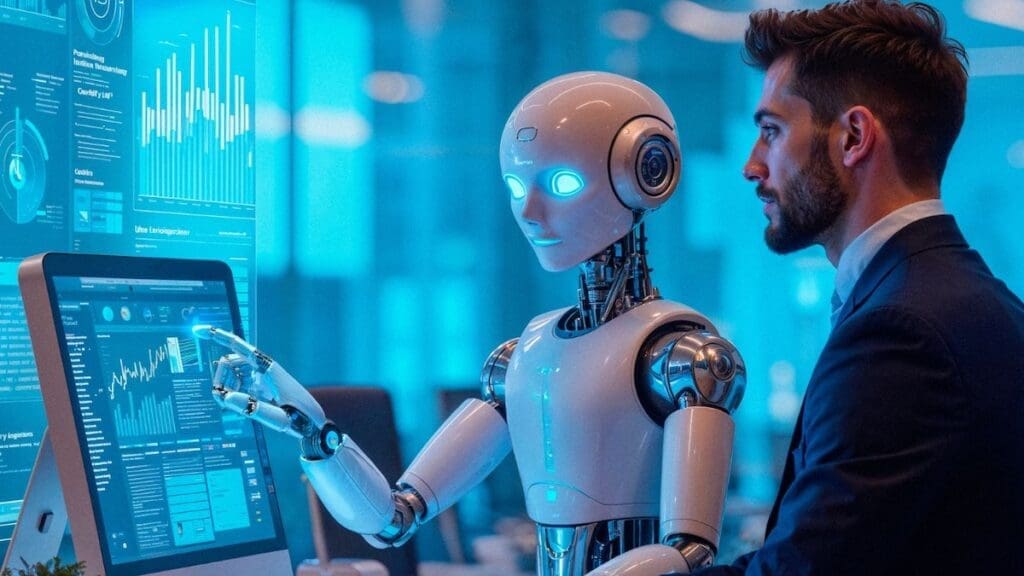Gone are the days when AI used to seem futuristic. Today, the marketing world is driven by Artificial Intelligence. In 2026, the question for businesses is not whether or not they will integrate AI, but how quickly they will do so. Machine learning models, predictive analytics, and generative AI are reshaping everything from how we create content and how we optimize campaigns.
Table of Contents
In this blog, we will outline how AI will revolutionize digital marketing in 2026. It goes on to list the tools behind this transformative process, its pros and cons, and what will become of marketers.
AI in Digital Marketing
AI will disrupt digital marketing as it is set to enhance the whole field. This will help brands smartly communicate their message with the marketing AI copy generator. AI is enhancing marketing skills in 2026 and beyond.
AI systems can;
- Process millions of data points instantly.
- Predict user behavior with unmatched accuracy.
- Personalize marketing messages in real time.
- Automate tasks previously requiring human intelligence.
Due to this shift, brands can now scale quicker, save costs, and create better connections with customers
Ways AI Is Revolutionizing Digital Marketing
Artificial intelligence is impacting all stages of the digital marketing funnel. Here are the most transformative ways AI is changing the industry.
1. Predictive Analytics for Smarter Decision-Making
By studying past behavior, trends, and engagement data AI models do predictions. Marketers now anticipate:
- What customers will buy
- When they will buy.
- What they need before they ask.
Better targeting, more optimized budgets, and better performing campaigns.
2. Hyper-Personalization at Scale
AI-powered personalization engines create customized messages for every user and it is based on:
- Browsing behavior.
- Purchase history.
- Demographics.
- Real-time interactions.
Customizing your emails, product suggestions, and ads will hugely boost conversions.
3. Automated Content Creation with Generative AI
Generative AI is changing the way digital marketing is done. Brands use AI to create:
- Blog posts.
- Social media content.
- Product descriptions.
- Ad creatives.
- Email sequences.
AI tools help increase output while decreasing production time while maintaining the brand voice.
4. Conversational Marketing Through AI Chatbots
AI chatbots handle customer interactions 24/7, providing:
- Instant support.
- Sales recommendations.
- Lead qualification.
- Personalized responses.
This improves engagement and reduces support costs.
5. AI-Driven Ad Optimization
AI automates:
- Real-time bidding.
- Audience targeting.
- Creative testing.
- Budget allocation.
Marketers achieve better results with less manual work.
Ultimate AI Marketing Tools and Platforms in 2026
This 2026 has seen the birth of a totally redesigned set of AI tools to simplify marketing workflows. Some of the most influential include.
- AI Text & Image Generators – Marketing for Content & Campaigns
- Google Performance Max AI – Enhanced ad optimization on Google channels through the use of AI.
- Jasper AI – advanced long-form content creation.
- HubSpot AI – It helps sales teams focus on winning deals.
- Lumen5 AI – automated video creation.
- Surfer AI – AI-driven SEO content optimization.
- Midjourney & Adobe Firefly – The generation of graphics for advertisement using AI.
Data-driven tools make it easier for faster marketing and smart campaign creation.
Key Applications of AI in Digital Marketing
The applications of AI and machine learning in digital marketing are powerfully impacting.
- Dynamic pricing.
- Voice search optimization.
- Customer journey mapping.
- Sentiment analysis.
- Social media listening.
- Automated A/B testing.
- Email marketing automation.
- SEO analysis and keyword clustering.
- Real-time analytics dashboards.
These functions increase accuracy, minimize human error, and provide deeper insight.
Benefits of Using AI
AI provides enormous value to digital marketing teams. Key benefits include.
1. Increased Efficiency
Tasks that once took hours now take seconds.
2. Better Decision-Making
Marketers can make choices based on accurate data not guess work with the help of AI
3. Higher Conversion Rates
Sales increase by targeted personalization and smart recommendation.
4. Reduced Costs
Automation cuts manpower hours and improves ROI.
5. Scale and Consistency
AI keeps performance and tone consistent across huge volumes of content and interactions.
Pros of AI in Digital Marketing
- Automates repetitive tasks.
- Enhances customer experience.
- Provides real-time insights.
- Improves campaign precision.
- Strengthens personalization.
- Enables predictive forecasting.
- Supports better content creation.
Cons of AI in Digital Marketing
No technology is without limitations. Key challenges include:
- Dependence on data accuracy.
- High initial implementation costs.
- Risk of reduced human creativity.
- Potential job displacement.
- Errors due to biased or incomplete datasets.
- Over-automation leading to impersonal experiences.
To avoid these drawbacks, you need to make AI and human intelligence balanced.
Examples of AI in Digital Marketing
AI is already everywhere. Some real-world examples include:
- Netflix recommends shows using predictive algorithms.
- Amazon suggests products based on your browsing and buying behaviour.
- Spotify makes personal playlists using machine learning.
- Coca-Cola uses AI to analyze social sentiment for campaign ideas.
- Sephora using AI chatbots for product selection.
- Starbucks applying predictive analytics to provide offers.
These innovations reshape user expectations globally.
Generative AI in Digital Marketing
Generative AI has become one of the most transformative technologies of 2023. Its abilities include:
- Generating social media posts.
- Writing SEO-optimized blogs.
- Producing ad copy.
- Creating product images.
- Designing landing pages.
- Crafting personalized outreach messages.
Marketers can rapidly produce creative materials at scale thanks to Generative AI.
What Is the Future of AI in Digital Marketing?
The future of AI is bold, fast, and customer-focused. In the coming years, AI will drive:
- Fully autonomous marketing campaigns.
- Advanced emotional intelligence in chatbots.
- AI-powered holographic customer experiences.
- Hyper-realistic AI video avatars.
- Deep personalization based on real-time biometrics.
- Predictive purchase journeys for all major industries.
Early adopters of AI will take the lead; those who are not will fall behind.
AI in Digital Marketing: What Are The Ethical Considerations?
As AI grows, so do ethical concerns. Marketers must address:
- Data privacy (GDPR, consent management).
- Algorithmic bias.
- Transparency in AI-generated content.
- Misuse of personal information.
- Authenticity of AI-created media.
In order to maintain brand trust and avoid legal cases, brands must implement responsible AI systems.
Conclusion
As of 2026, AI is all the rage when it comes to digital marketing. Brands can use it to engage customers and to attract new ones. It also helps with customer retention. With the help of predictive analytics and hyper-personalized messaging, generative AI content, and automated customer journeys, marketers can deliver more effective experiences at scale through AI.

